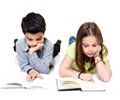A collection of picture book abstracts searchable by topics, concepts, and skills
for building content area literacy across all academic subjects
Recognized by the International Society for Technology in Education (2006) as one of the "101 Best Web Sites for Elementary Teachers"

